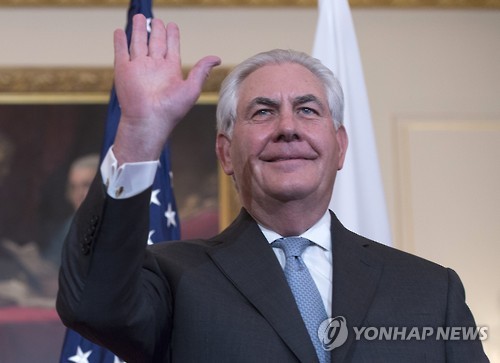US Secretary of State Rex Tillerson embarked on his first trip to Asia Tuesday, seeking to come up with better ways to deal with North Korea and defuse tensions with China over the ongoing deployment of the THAAD missile defense system in South Korea.
Other key objectives of the trip to Japan, South Korea and China include bolstering alliances with Seoul and Tokyo in the face of North Korean threats, especially at a time when the South is gearing up to elect a new leader after former President Park Geun-hye was ousted from office for corruption.
 |
US Secretary of State Rex Tillerson (Yonhap) |
The trip comes amid heightened tensions in the region in the wake of North Korea's successive ballistic missile launches as well as concern the communist nation might undertake additional provocations, such as a nuclear test.
"This trip will allow Secretary Tillerson to engage allies and partners on not only a range of bilateral issues, also importantly to discuss and coordinate strategy to address the advancing nuclear missile threat from North Korea," Acting Assistant Secretary Susan Thornton said at a briefing Monday to preview the trip.
"The United States is committed to holding North Korean accountable for its flagrant and repeated disregard of UN Security Council resolutions which explicitly prohibit ballistic missile and nuclear programs. We will defend our friends and allies, of course, the Republic of Korea and Japan," she said.
Persuading China to exercise greater pressure on Pyongyang is high on Tillerson's agenda.
US President Donald Trump has made it a key priority of his administration to get Beijing to exercise more leverage as the main energy and food provider for North Korea to rein in the provocative regime. Trump has long said that North Korea is China's problem to fix.
In a media interview last month, Trump said that China can solve the problem "very easily if they want to." He welcomed Beijing's recent decision to suspend coal imports from North Korea, but said China should put more pressure on Pyongyang.
China is expected to reiterate its objections to the deployment of a Terminal High Altitude Area Defense battery that the US has begun to place in South Korea to bolster defenses against growing missile threats from North Korea.
Beijing has railed against the deployment, claiming that the system, especially its powerful radar, could be used to spy on the country and undermine its nuclear deterrent, despite repeated assurances from Washington that the battery is designed only to defend against North Korean threats.
After visiting Tokyo from Wednesday, Tillerson will fly to Seoul on Friday for talks with South Korean Foreign Minister Yun Byung-se. He's also scheduled to meet with Acting President and Prime Minister Hwang Kyo-ahn.
His discussions not only on North Korea, but also on the THAAD deployment will be a key focus of media attention amid speculation that South Korea could reverse its decision to host the battery if a liberal leader takes power in the upcoming presidential election.
Former President Park's ouster came just days after the US brought into South Korea the first elements of a THAAD battery, and her exit could raise doubts about her decision to host THAAD amid intensifying pressure from China.
Tillerson is scheduled to visit Beijing on Friday for talks with Foreign Minister Wang Yi and other top officials. When the two top diplomats met last month, Tillerson urged Wang to "use all available tools to moderate North Korea's destabilizing behavior."
The two sides are also expected to finalize details of Chinese President Xi Jinping's trip to the US. (Yonhap)








